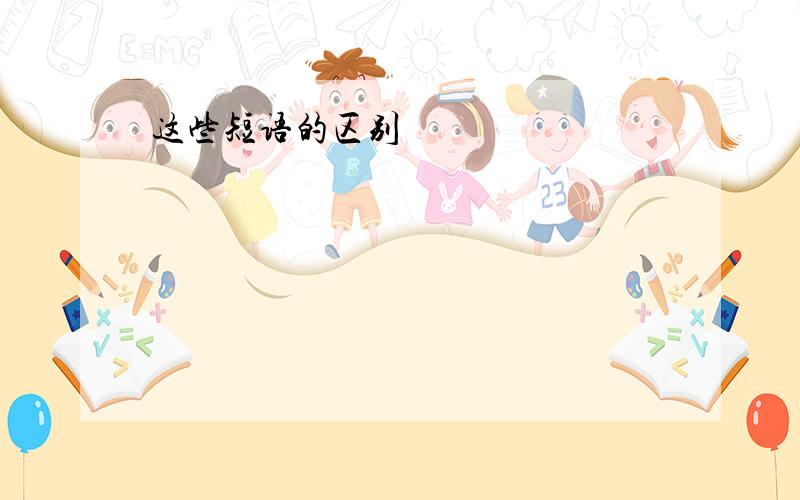这些短语的区别
来源:学生作业帮 编辑:神马作文网作业帮 分类:英语作业 时间:2024/09/30 08:39:17
What's worse 和 How is the worse called in 和 called for a large number of 和 plenty of To be getting 和 To get wear 和 dress

解题思路: 同学,你好,因网站有规定,一次解答一道题,所以请你谅解!
解题过程:
call in 和 call for :
call in 作"请来"、"找来"、"召来"解,"请人来作某种专业的咨询或帮忙"的意思。如:
Your father is ill, you should call in a doctor at once.你父亲病了,应该马上去请个大夫来。
The police have been called in to help make it clear.
已请来了警察帮忙把这件事弄清楚。
call for 有几个不同的意思:
1.作"要求"、"需要"、"提倡"解。如:
Success calls for hard work.
成功要靠勤奋。
People are calling for the freedom of all slaves.人们要求解放所有奴隶。
The work calls for a lot of time.
这项工作需要大量时间。
2.表示"接(某人)"、"来取(某物)"。如:
I'll call for you at sever this evening.
今晚七点我来接你。
We call for the package at the post office.我们到邮局去取包裹。
3.表示"喊着要人取来",相当于ask for。如:
The man sat down and called for a glass of beer.
那人坐下来,要了一杯啤酒。 a large number of 和 plenty of :
a large numbe of 只可修饰可数名词复数形式;而plenty of 既可以修饰可数名词也可以修饰不可数名词。
wear 和 dress :
1) wear是“穿着”“戴着”的意思,可以用于穿衣服、穿鞋、戴帽子、戴手套、佩戴首饰等,强调“穿着”的状态。
Tom always wears black shoes.
He wears a raincoat even when it is fine.
She doesn't like to wear a red flowers in her hair.
2) dress可以作及物动词和不及物动词,有“穿着”“打扮”的意思。作“穿着”解时,只用于穿衣服,不用于穿鞋、戴帽、戴手套。作为及物动词用时,它的宾语是人,不是衣服。dress sb. (给某人穿衣服),而wear作“穿着”用时,也是及物动词,但它的宾语是物,不是人,即wear sth.(穿着衣物)。
She always dresses well.
Get up and dress quickly.
Mary is dressing her child.
最终答案:略
解题过程:
call in 和 call for :
call in 作"请来"、"找来"、"召来"解,"请人来作某种专业的咨询或帮忙"的意思。如:
Your father is ill, you should call in a doctor at once.你父亲病了,应该马上去请个大夫来。
The police have been called in to help make it clear.
已请来了警察帮忙把这件事弄清楚。
call for 有几个不同的意思:
1.作"要求"、"需要"、"提倡"解。如:
Success calls for hard work.
成功要靠勤奋。
People are calling for the freedom of all slaves.人们要求解放所有奴隶。
The work calls for a lot of time.
这项工作需要大量时间。
2.表示"接(某人)"、"来取(某物)"。如:
I'll call for you at sever this evening.
今晚七点我来接你。
We call for the package at the post office.我们到邮局去取包裹。
3.表示"喊着要人取来",相当于ask for。如:
The man sat down and called for a glass of beer.
那人坐下来,要了一杯啤酒。 a large number of 和 plenty of :
a large numbe of 只可修饰可数名词复数形式;而plenty of 既可以修饰可数名词也可以修饰不可数名词。
wear 和 dress :
1) wear是“穿着”“戴着”的意思,可以用于穿衣服、穿鞋、戴帽子、戴手套、佩戴首饰等,强调“穿着”的状态。
Tom always wears black shoes.
He wears a raincoat even when it is fine.
She doesn't like to wear a red flowers in her hair.
2) dress可以作及物动词和不及物动词,有“穿着”“打扮”的意思。作“穿着”解时,只用于穿衣服,不用于穿鞋、戴帽、戴手套。作为及物动词用时,它的宾语是人,不是衣服。dress sb. (给某人穿衣服),而wear作“穿着”用时,也是及物动词,但它的宾语是物,不是人,即wear sth.(穿着衣物)。
She always dresses well.
Get up and dress quickly.
Mary is dressing her child.
最终答案:略